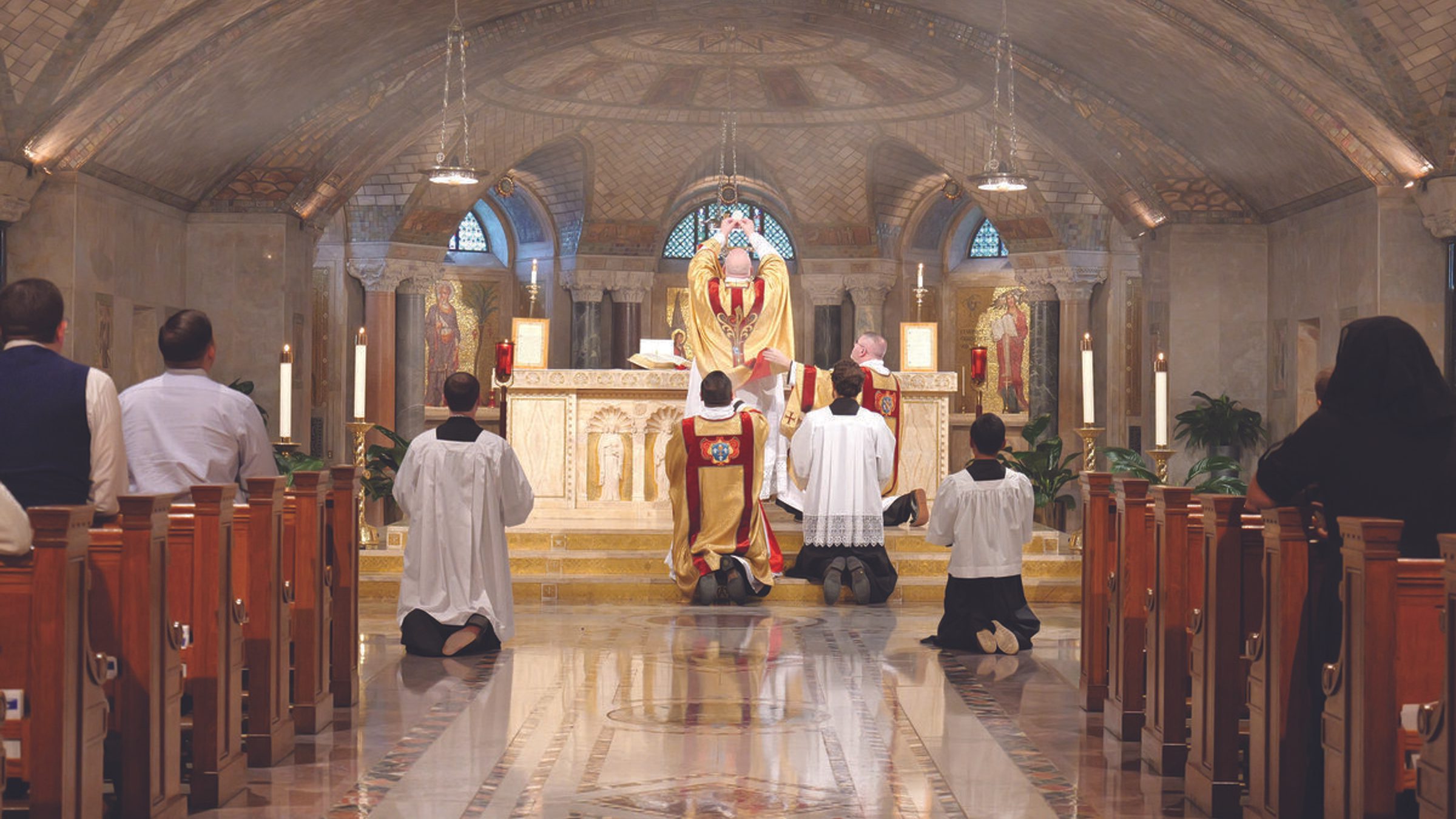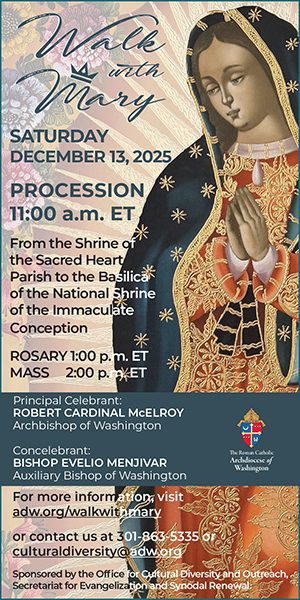St. John Henry Newman, who came into full communion with the Catholic Church from the Anglican Church of England – spending about equal halves of his life in each – was the most influential English-speaking Catholic theologian of the 19th century. A member of the Oxford Movement – so-called because most of its devotees were associated with Oxford University – Newman favored the inclusion of older Christian traditions in both Anglican theology and rites and ultimately the unity of the Anglican tradition with the Catholic Church.
That vividly and finally realized intent was alive in a Catholic liturgy – commemorating Newman himself – held August 3 in the Crypt Church of the Basilica of the National Shrine of the Immaculate Conception in Washington.
Clouds of incense billowed throughout the crypt as the priests in golden vestments celebrated Solemn Mass, according to “Divine Worship: The Missal”, which provides the form of the Mass for the Catholic Church’s personal ordinariates for the Anglican tradition.
Sung and chanted Latin abounded as the Mass was celebrated in traditional English “ad orientem” – an ancient Christian tradition of the people and the priest both facing the same direction “to the east” in offering worship together toward God.
In the ordinariate form of Solemn Mass, the priest is assisted by a deacon and a lay instituted acolyte acting as a “subdeacon” – visibly representing the priesthood, diaconate, and laity at the altar – while additional priests would concelebrate. Another custom, the option followed in this case, is to have priests fill all three roles.
Without aid from the brochure provided, Catholics unfamiliar with the ordinariate form of worship might easily have assumed they were seeing a traditional Latin Mass celebrated in traditional English – the type of English in which Catholics typically pray the “Our Father” in Mass. Others would have recognized prayers from the standard form of the Roman Rite on which the ordinariate’s Divine Worship Mass is actually built to graft in unique Anglican prayers, such as the pre-Communion “Prayer of Humble Access”.
“Whether this is your first ordinariate Mass or your 1000th, I’m sure you will agree – it is something special,” Father Nathan Davis, parochial administrator of Our Lady of Grace Catholic Church, an ordinariate parish community in Covina, California, said in his homily. Not only visually, Father Davis noted, “but also for the words, phrases, and prayers we have received as part of our patrimony ... the beauty of these prayers, this crypt chapel, the smells and bells and all the music, form one cohesive action proper to the worship of the Holy Trinity.”
As Father Davis said during his homily, ordinariate parishes and communities are part of the Roman Catholic Church, so any Catholic can join in the ordinariate Mass.
Established by Pope Benedict XVI in 2009, the ordinariates are effectively Catholic dioceses with Anglican traditions and celebrate the Mass, liturgy of the hours, sacraments and other liturgies in traditional English according to books approved by Pope Francis.
Pope Benedict originally conceived the ordinariates as a permanent, pastoral response to whole congregations from the Anglican tradition – such as Anglicans, Episcopalians and Methodists – asking to enter the Catholic Church with their traditions. In 2019, Pope Francis expanded the ordinariates’ missionary mandate to invite all Protestant Christians into full Catholic communion and enliven the faith of Catholics who had weakened or fallen away from the practice of the faith.
“This Mass brings to full circle something that happened over 10 years ago, when the community of St. Luke’s, from the Episcopal Church, was received formally into the Catholic Church at this very crypt Church,” explained James Griffin, executive director of the Philadelphia-based Durandus Institute and Master of Ceremonies for the liturgy.
In 2011, then-Archbishop of Washington, Cardinal Donald W. Wuerl, welcomed the approximately 100-member congregation of what is now St. Luke’s Catholic Church in Oxon Hill, Maryland. Their pastor, Father Mark Lewis, was later ordained as a Catholic priest for the Ordinariate of the Chair of St. Peter. The ordinariate has 41 parishes and communities in the U.S. and Canada.
“This is the first time the ordinariate’s Divine Worship missal has been used at the National Shrine,” Griffin noted.
While historians often date the birth of Anglicanism and subsequent development to the Protestant Reformation – in 1534 King Henry VIII was declared by Parliament as the “Supreme Head of the Church of England” ensuring a separation from Rome – its distinctiveness also draws on more than eight centuries’ worth of earlier Catholic influences in the British isles, a rich inheritance drawn upon in the 2015 Divine Worship missal used by the ordinariates.
“We have many cradle Catholics who never grew up in the Anglican Church or a Protestant Church, but nevertheless feel drawn to the tradition that’s represented with our missal through the Anglo-Catholic movement, which tried to restore Catholic devotion within the Church of England during the Oxford Movement,” said Griffin. “And now, those traditions – as well as the hieratic language of the Book of Common Prayer, which appeals to many people with its more traditional expressions of English – are fully grafted into the fullness of the Catholic faith as an approved liturgy by Rome that all Catholics can attend and receive Holy Communion at.”
The “Prayer Book English” of the Divine Worship missal is appropriately solemn, yet still accessible.
“I often find people that respond to it are looking for something a little bit more traditional than they might find in their regular parish, but the Latin Mass might be a little too much for them,” said Father Jason Catania, the celebrant, who serves St. Luke’s.
Father Catania, who brought the Baltimore ordinariate parish Mount Calvary into the Catholic Church from the Episcopal Church and was one of the first priests ordained for the ordinariate, extended a warm invitation to the curious.
“I would encourage them – if they have an ordinariate community nearby – go and visit them,” Father Catania said. “Go and help them; go encourage them. Many of our parishes are just getting started – and so, we encourage anyone who feels like this might enrich them spiritually to come, and be a part of this,” he added. “Even if you’re a life-long Catholic, you’re welcome to worship with us.”
Music for the ordinariate Mass focused not only on Newman’s own contributions – notably, his verse settings for hymns – but also a generous selection of English composer William Byrd’s compositions, marking the 400th anniversary year of his death. Renowned choral ensemble The Suspicious Cheese Lords – the Washington-based group sang for Pope Benedict XVI during his 2008 U.S. apostolic visit, and its name is a playful inversion of the title of a Thomas Tallis musical composition, “Suscipe quaeso Domine” – provided splendidly resonant vocal contributions.
Lest such a liturgy be branded an exercise in retrieval or nostalgia, Griffin offered a succinct reflection about its place in the Church’s evangelizing mission today. “It’s not about the maintaining of ashes,” he emphasized, “but the preservation of fire.”











